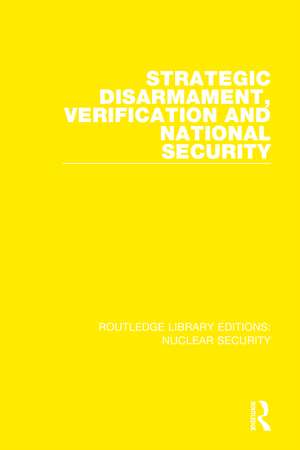Strategic Disarmament, Verification and National Security: Routledge Library Editions: Nuclear Security
Autor Stockholm International Peace Research Instituteen Limba Engleză Paperback – 4 sep 2022
Previous studies had been mainly descriptive or historical, lacking in objective political analysis, and tending to political bias, depending on the political school of the author. There was thus some justification for the statement made by some outstanding authorities in the field that 'to date, no systematic analysis has been attempted to determine what disarmament measures would optimally require of verification methods...' Our ambition is to respond to this criticism, at least so far as the strategic context of disarmament is concerned.
Chapter 1 introduces us to the enormous range of repercussions caused by a disarmament agreement. Chapter 2 examines the concept of verification, analysing the meaning of the term, presenting various definitions of what verification is and attempting to systematize the concept.
It has been noted on many occasions that the verification set up in a disarmament treaty is only one of a number of factors working towards compliance with a treaty. In fact the role of verification in presenting the treaty, and therefore the security of its participants, is to a large extent limited. However, without many other conditions being satisfied verification on its own can do little to preserve the treaty regime. Chapter 3 discusses these conditions. Chapter 4 gives a brief analysis of the concept of national interests in general, and the concept of national security in particular.
Among all the elements of 'security', it is military security that plays by far the largest role. Because of this. Chapter 5 considers a specific case of strategic military security, in which security, defined as stable strategic deterrence between two states, is analysed.
Finally, Chapter 6 analyses the question of what happens to security based on strategic deterrence when states enter into the disarmament process. More specifically, the role of verification in preserving security in such circumstances is analysed, thereby answering the main problem of the book. The supporting data for Chapter 6 is given in the Appendix.
| Toate formatele și edițiile | Preț | Express |
|---|---|---|
| Paperback (1) | 315.09 lei 6-8 săpt. | |
| Taylor & Francis – 4 sep 2022 | 315.09 lei 6-8 săpt. | |
| Hardback (1) | 700.30 lei 6-8 săpt. | |
| Taylor & Francis – 2 dec 2020 | 700.30 lei 6-8 săpt. |
Din seria Routledge Library Editions: Nuclear Security
-
 Preț: 245.87 lei
Preț: 245.87 lei -
 Preț: 313.34 lei
Preț: 313.34 lei -
 Preț: 323.58 lei
Preț: 323.58 lei -
 Preț: 322.97 lei
Preț: 322.97 lei -
 Preț: 243.54 lei
Preț: 243.54 lei -
 Preț: 349.05 lei
Preț: 349.05 lei -
 Preț: 322.97 lei
Preț: 322.97 lei - 18%
 Preț: 782.44 lei
Preț: 782.44 lei -
 Preț: 316.06 lei
Preț: 316.06 lei - 18%
 Preț: 891.36 lei
Preț: 891.36 lei -
 Preț: 267.34 lei
Preț: 267.34 lei -
 Preț: 243.84 lei
Preț: 243.84 lei -
 Preț: 313.34 lei
Preț: 313.34 lei - 18%
 Preț: 787.17 lei
Preț: 787.17 lei -
 Preț: 323.58 lei
Preț: 323.58 lei - 15%
 Preț: 695.90 lei
Preț: 695.90 lei -
 Preț: 270.49 lei
Preț: 270.49 lei - 18%
 Preț: 891.36 lei
Preț: 891.36 lei -
 Preț: 310.66 lei
Preț: 310.66 lei - 18%
 Preț: 782.44 lei
Preț: 782.44 lei -
 Preț: 313.34 lei
Preț: 313.34 lei -
 Preț: 349.80 lei
Preț: 349.80 lei - 15%
 Preț: 697.53 lei
Preț: 697.53 lei -
 Preț: 315.68 lei
Preț: 315.68 lei -
 Preț: 242.53 lei
Preț: 242.53 lei - 18%
 Preț: 790.66 lei
Preț: 790.66 lei - 18%
 Preț: 790.82 lei
Preț: 790.82 lei - 15%
 Preț: 700.30 lei
Preț: 700.30 lei - 15%
 Preț: 699.46 lei
Preț: 699.46 lei - 33%
 Preț: 11400.92 lei
Preț: 11400.92 lei - 18%
 Preț: 895.94 lei
Preț: 895.94 lei - 18%
 Preț: 904.61 lei
Preț: 904.61 lei
Preț: 315.09 lei
Nou
Puncte Express: 473
Preț estimativ în valută:
60.29€ • 62.20$ • 50.31£
60.29€ • 62.20$ • 50.31£
Carte tipărită la comandă
Livrare economică 26 martie-09 aprilie
Preluare comenzi: 021 569.72.76
Specificații
ISBN-13: 9780367511852
ISBN-10: 0367511851
Pagini: 190
Dimensiuni: 156 x 234 x 10 mm
Greutate: 0.27 kg
Ediția:1
Editura: Taylor & Francis
Colecția Routledge
Seria Routledge Library Editions: Nuclear Security
Locul publicării:Oxford, United Kingdom
ISBN-10: 0367511851
Pagini: 190
Dimensiuni: 156 x 234 x 10 mm
Greutate: 0.27 kg
Ediția:1
Editura: Taylor & Francis
Colecția Routledge
Seria Routledge Library Editions: Nuclear Security
Locul publicării:Oxford, United Kingdom
Public țintă
Postgraduate, Professional, and UndergraduateCuprins
Introduction 1. The Impact of Disarmament Agreements 2. Verification and its Role in Disarmament 3. Conditions for Implementation of Disarmament Agreements Other than Verification 4. National Interests and National Security in Relation to Disarmament 5. Strategic Military Security through Stable Deterrence 6. Security and Verification in Strategic Arms Limitation – A Case Study. Conclusions. Appendix.
Descriere
Originally published in 1977, the purpose of this book was to analyse the relationship between the security of two states mutually undergoing strategic disarmament at the time and the need for safeguarding their security by means of a verification system.
